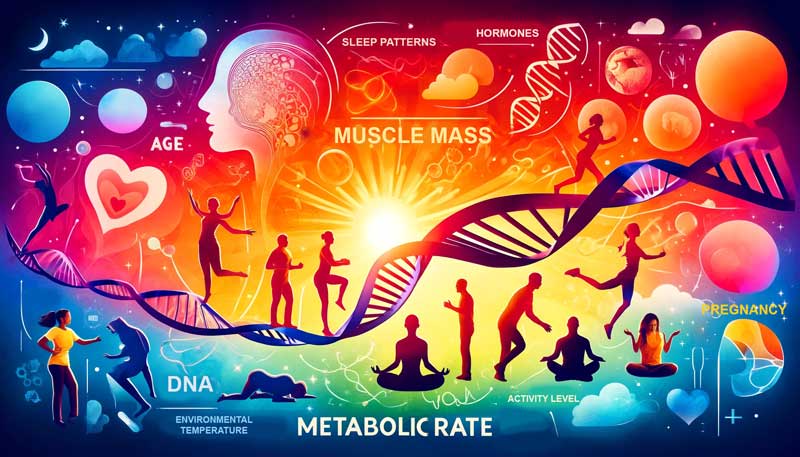Metabolic rate plays a crucial role in health and fitness, impacting daily life and overall well-being. As someone who leads an active lifestyle, I understand the importance of maintaining a healthy metabolic rate to support my energy levels and body composition goals.
In this post, we will explore the intricacies of metabolic rate, its significance in weight management, and its impact on energy levels and overall health. We will delve into the factors influencing metabolic rate and discuss practical ways to optimise it for improved well-being.
By the end of this post, you will have a deeper understanding of how metabolic rate affects your daily life and how to harness this knowledge to make informed decisions about your health and fitness. Let’s embark on this journey together and uncover the secrets to unlocking your body’s full potential.
What is Metabolic Rate?
Metabolic rate refers to the energy your body expends to maintain its essential functions, such as breathing, circulation, and digestion. It is the rate at which your body converts food into energy, measured in calories (kcal).
Resting Metabolic Rate (RMR)
Resting Metabolic Rate (RMR), or resting energy expenditure, is the number of calories your body burns while at rest. It accounts for 60-75% of your total daily energy expenditure. RMR is an essential component of your overall metabolic rate. It plays a significant role in determining your daily caloric needs.
Accurately measuring RMR requires specialised equipment and controlled conditions, so many people use predictive equations or refer to their Basal Metabolic Rate (BMR) instead. BMR is similar to RMR but is measured under more strict conditions, such as being in a fasted state and at complete rest in a temperature-neutral environment.

Energy Expenditure During Physical Activity
Physical activity significantly increases metabolic rate, potentially raising energy expenditure by up to 20 times the resting level during intense exercise. The energy expended during exercise depends on factors such as:
- Intensity: Higher-intensity activities burn more calories per unit of time.
- Duration: Longer workouts result in more significant total energy expenditure.
- Type of activity: Different activities have varying energy demands, with weight-bearing exercises generally burning more calories than non-weight-bearing activities.
Regular physical activity supports weight management and promotes overall health and well-being. Incorporating various exercises into your routine can help optimise your metabolic rate and achieve your fitness goals, whether you’re looking to maintain your current weight, lose excess body fat, or build lean muscle mass.
Metabolic Rate Differences Among Individuals
Metabolic rates can vary significantly from one person to another, influenced by a complex relationship of factors such as age, sex, body composition, and genetics. Recognising these differences is crucial for developing personalised approaches to health and fitness.
Some key factors that contribute to individual variations in metabolic rate include:
- Age: As we age, our metabolic rate tends to slow down, primarily due to changes in body composition, such as a decrease in muscle mass and an increase in fat mass.
- Sex: On average, men have higher metabolic rates than women, mainly due to differences in body composition. Men typically have lean muscle mass, which is more metabolically active than fat tissue.
- Body Composition: Individuals with a higher proportion of lean muscle mass tend to have higher metabolic rates compared to those with a higher percentage of body fat.
- Genetics: Variations in genes related to energy metabolism, such as those involved in mitochondrial function or thyroid hormone regulation, can influence an individual’s metabolic rate.
These differences in metabolic rate can have significant implications for health outcomes. For example:
- Individuals with a lower metabolic rate may be more prone to weight gain and obesity as they burn fewer calories at rest.
- People with a higher proportion of lean muscle mass may have better insulin sensitivity and a reduced risk of developing type 2 diabetes.
- Ageing-related declines in metabolic rate can contribute to age-associated weight gain and increased risk of chronic diseases, such as cardiovascular disease and certain cancers.
These factors impact individual variations in metabolic rate. They need to be considered and targeted to optimise health and well-being. This may include personalised nutrition plans, exercise programs, and lifestyle interventions considering an individual’s metabolic profile.

Key Factors Influencing Your Metabolic Rate
Several factors play a crucial role in determining your metabolic rate. Understanding these factors can help you make informed decisions about your health and fitness.
- Age: As we age, our metabolic rate naturally slows down. This is primarily due to changes in body composition, with a decrease in muscle mass and an increase in fat mass. Maintaining a healthy lifestyle through regular exercise and a balanced diet can help mitigate the age-related decline in metabolic rate.
- Muscle Mass: Muscle tissue is more metabolically active than fat tissue. Individuals with higher muscle mass tend to have a higher resting metabolic rate. Resistance training exercises can help build and maintain muscle mass, boosting metabolism.
- Activity Level: Physical activity is a crucial determinant of your metabolic rate. Regular exercise increases your energy expenditure during the activity and helps maintain a higher metabolic rate throughout the day. Aim to incorporate cardio and strength training exercises into your routine.
- Genetic Makeup: Your genes determine your metabolic rate. Some individuals may be genetically predisposed to having a higher or lower metabolism. While you cannot change your genes, focusing on healthy lifestyle habits can help optimise your metabolic rate.
Other factors that can influence your metabolic rate include:
- Hormones: Thyroid hormones, in particular, play a significant role in regulating metabolism. Imbalances in thyroid function can lead to changes in metabolic rate.
- Environmental Temperature: Exposure to cold temperatures can temporarily increase your metabolic rate as your body works to maintain its core temperature.
- Pregnancy: The resting metabolic rate (RMR) increases throughout pregnancy, from the first trimester to the third. This rise is due to the additional body mass and physiological changes, such as enhanced cardiac output.
- Sleep Patterns: Lack of sleep or poor sleep quality has been associated with metabolic function and hormonal balance disruptions.
While factors influencing metabolic rates, such as age and genetics, are beyond our control, we can still make many lifestyle choices to support a healthy metabolism.
We can proactively optimise our metabolic health by building and maintaining muscle mass through resistance training, staying physically active, getting enough sleep, and being mindful of hormonal and environmental factors.
How Metabolic Rate Influences Weight Management
Metabolic rate plays a crucial role in effectively managing body weight. It determines the number of calories your body burns at rest and during physical activity, ultimately impacting whether you maintain, gain, or lose weight.
Individuals with a higher metabolic rate tend to burn more calories throughout the day, even when not actively exercising. This can make it easier for them to maintain a healthy weight or facilitate weight loss combined with a balanced diet and regular physical activity.
Conversely, those with a lower metabolic rate may struggle with weight management. A slower metabolism means fewer calories burned at rest, which can contribute to weight gain over time, significantly if calorie intake exceeds expenditure.
Factors identified in the above section, such as age, muscle mass, and genetics, can influence an individual’s metabolic rate. As we age, our metabolism naturally slows down, making it more challenging to maintain a healthy weight. However, building and preserving lean muscle mass through resistance training can help boost metabolism, as muscle tissue is more metabolically active than fat tissue.
It’s important to note that while metabolic rate plays a significant role in weight management, it is not the sole determinant. Factors like diet, physical activity, and hormonal balance regulate body weight.
Crash diets and extreme calorie restriction slow metabolism as the body adapts to the perceived energy scarcity. This can lead to plateaus in weight loss and make it harder to maintain weight in the long term.
The most effective approach to weight management is a combination of a balanced diet, regular physical activity, and lifestyle habits that support a healthy metabolic rate. This may include incorporating strength training exercises to build lean muscle mass, staying hydrated, getting sufficient sleep, and managing stress levels.

The Role of Metabolic Rate in Energy Levels
Your metabolic rate significantly influences your energy levels throughout the day. A higher metabolic rate generally correlates with greater vitality and reduced feelings of fatigue as your body efficiently converts fuel into energy.
Conversely, a slower metabolism can lead to decreased energy levels, making it more challenging to maintain stamina and cope with daily activities. This is particularly evident in ageing, where sarcopenia (loss of muscle mass) and increased fat mass can contribute to metabolic stress and disorders.
As we age, organ and tissue mass reductions and tissue-specific metabolic changes result in a lower resting metabolic rate (RMR). This decrease in RMR promotes alterations in body composition, favouring increased fat mass and reduced fat-free mass, which can further impact energy levels.
Mitochondrial dysfunction (when the mitochondria, the energy-producing structures within cells, fail to work correctly) also plays a role in energy production and fatigue. Enhanced glycolytic activity can lead to excessive reactive oxygen species, causing endothelial cell dysfunction, inflammation, and impaired mitochondrial function. This disruption in cellular metabolism results in diminished ATP synthesis and energy supply, creating a vicious cycle that affects overall vitality.
Maintaining a healthy metabolic rate through regular physical activity, particularly resistance training to preserve muscle mass, can help sustain energy levels throughout the day. Additionally, supporting mitochondrial function through a balanced diet of antioxidants and essential nutrients can contribute to optimal energy production and reduce fatigue.
Metabolic Rate and Overall Health
A healthy metabolic rate is crucial for overall health and well-being. Metabolic health plays a significant role in the prevention and management of chronic diseases such as metabolic syndrome, diabetes, and heart disease.
Metabolic syndrome is a cluster of conditions, including high blood pressure, high blood sugar, excess body fat around the waist, and abnormal cholesterol levels. That increases the risk of heart disease, stroke, and type 2 diabetes. A slower metabolic rate can contribute to the development of these conditions by promoting weight gain and insulin resistance.
Similarly, a lower metabolic rate can make it more challenging to manage blood sugar levels. Thus increasing the risk of developing type 2 diabetes. Individuals with diabetes may also experience a further decline in metabolic rate, creating a vicious cycle that can exacerbate the condition.
Cardiovascular health is also closely linked to metabolic rate. Poor metabolic health can lead to endothelial dysfunction, chronic inflammation, and oxidative stress, all of which contribute to the development and progression of heart disease.
Engaging in activities that boost metabolic rates, such as high-intensity interval training (HIIT) and resistance training, can improve insulin sensitivity, reduce inflammation, and support cardiovascular health. Adopting a diet rich in whole foods, lean proteins, and healthy fats can optimise metabolic function and reduce the risk of chronic diseases.

Practical Ways to Adjust Your Metabolic Rate
Modifying your metabolic rate through diet and lifestyle changes can significantly impact your overall health and weight management goals. Here are some actionable tips to help you boost your metabolism:
- Engage in Regular Exercise
- Incorporate a combination of cardio and resistance training exercises into your routine.
- High-intensity interval training (HIIT) can be particularly effective in boosting metabolic rate.
- Aim for at least 150 minutes of moderate-intensity or 75 minutes of vigorous-intensity exercise per week.
- Build and Maintain Muscle Mass
- Focus on strength training exercises that target major muscle groups.
- Increase your protein intake to support muscle growth and repair.
- Maintain a consistent resistance training routine to prevent age-related muscle loss.
- Stay Active Throughout the Day
- Engage in non-exercise activity thermogenesis (NEAT) by taking the stairs, walking more, and doing household chores.
- Take regular breaks from sitting by standing up and stretching or taking short walks.
- Consider using a standing desk or sitting on an exercise ball to increase daily calorie burn.
- Eat a Balanced, Nutrient-Dense Diet
- Prioritise whole foods, such as fruits, vegetables, lean proteins, and whole grains.
- Avoid restrictive diets that can slow down your metabolism.
- Incorporate healthy fats, such as avocados, nuts, and fatty fish, to support metabolic health.
- Stay Hydrated
- Drink plenty of water throughout the day to support metabolic processes.
- Consider drinking green tea containing catechins that may help boost metabolism slightly.
- Avoid sugary drinks and excessive alcohol consumption, which can contribute to weight gain.
- Get Enough Quality Sleep
- Aim for 7-9 hours of sleep per night to support metabolic function and hormonal balance.
- Establish a consistent sleep schedule and create a relaxing bedtime routine.
- Avoid electronic devices and stimulating activities close to bedtime.
- Manage Stress Levels
- Practice stress-reduction techniques, such as meditation, deep breathing, or yoga.
- Engage in hobbies and activities that you enjoy to promote relaxation.
- Seek support from friends, family, or a mental health professional when needed.
Remember, making sustainable lifestyle changes is critical to long-term success in boosting your metabolic rate. Start by incorporating these tips into your daily routine and gradually build upon them.
It’s also essential to consult with a healthcare professional before significantly changing your diet or exercise programme, especially if you have underlying health conditions.
Conclusion
Throughout this post, we have explored the significance of metabolic rate in maintaining optimal health and well-being. Understanding the intricacies of your metabolism and how it influences various aspects of your life, from weight management to energy levels and overall health, is crucial for making informed decisions about your lifestyle.
We have discussed factors contributing to individual variations in metabolic rates, such as age, sex, body composition, and genetics. Recognising these differences can help you develop a personalised approach to optimising your metabolism and achieving your health goals.
Additionally, we have highlighted practical ways to adjust your metabolic rate through diet, exercise, and other lifestyle interventions. Incorporating regular physical activity, building and maintaining muscle mass, staying hydrated, and eating a balanced diet are all essential components of a comprehensive plan to support metabolic health. Also, getting sufficient sleep and managing stress levels are crucial components of a comprehensive plan to support metabolic health.
It is important to remember that metabolic health is not a one-size-fits-all approach. What works for one person may not work for another, and listening to your body and making adjustments is crucial.
Seeking guidance from healthcare professionals, such as registered dietitians or certified fitness trainers, can help you develop a tailored plan that meets your unique needs and goals.
Engaging in ongoing education and staying informed about the latest research and developments in metabolic health is also essential. As our understanding of metabolism evolves, new insights and strategies may emerge to further optimise your health and well-being.
You can start today by implementing small, sustainable changes in your daily routine and gradually building upon them over time.
Sources
- Arciero, P. J., Goran, M. I., & Poehlman, E. T. (1993). Resting metabolic rate is lower in women than in men. Journal of Applied Physiology, 75(6), 2514-2520.
- Brent, G. A. (2012). Mechanisms of thyroid hormone action. The Journal of Clinical Investigation, 122(9), 3035-3043.
- Chistiakov, D. A., Shkurat, T. P., Melnichenko, A. A., Grechko, A. V., & Orekhov, A. N. (2018). The role of mitochondrial dysfunction in cardiovascular disease: a brief review. Annals of Medicine, 50(2), 121-127.
- Gallagher, D., Belmonte, D., Deurenberg, P., Wang, Z., Krasnow, N., Pi-Sunyer, F. X., & Heymsfield, S. B. (1998). Organ-tissue mass measurement allows modeling of REE and metabolically active tissue mass. American Journal of Physiology-Endocrinology and Metabolism, 275, E249-E258.
- Henry, C. J. (2005). Basal metabolic rate studies in humans: measurement and development of new equations. Public Health Nutrition, 8(7a), 1133-1152.
- Hume, D. J., Yokum, S., & Stice, E. (2016). Low energy intake plus low energy expenditure (low energy flux), not energy surfeit, predicts future body fat gain. The American Journal of Clinical Nutrition, 103(6), 1389-1396.
- Karakelides, H., & Nair, K.S. (2005). Sarcopenia of aging and its metabolic impact. Current Topics in Developmental Biology, 68, 123–148.
- Levine, J. A. (2005). Measurement of energy expenditure. Public Health Nutrition, 8(7A), 1123-1132.
- Loos, R. J. F., & Rankinen, T. (2005). Gene-diet interactions on body weight changes. Journal of the American Dietetic Association, 105(5), 29-34.
- McMurray, R. G., Soares, J., Caspersen, C. J., & McCurdy, T. (2014). Examining variations of resting metabolic rate of adults: a public health perspective. Medicine and science in sports and exercise, 46(7), 1352-1358.
- Müller, M. J., Bosy-Westphal, A., Later, W., Haas, V., & Heller, M. (2009). Functional body composition: insights into the regulation of energy metabolism and some clinical applications. European Journal of Clinical Nutrition, 63(9), 1045-1056.
- Pinheiro Volp, A. C., Esteves de Oliveira, F. C., Duarte Moreira Alves, R., Esteves, E. A., & Bressan, J. (2011). Energy expenditure: components and evaluation methods. Nutricion hospitalaria, 26(3), 430-440.
- Ravussin, E., & Bogardus, C. (2000). Energy balance and weight regulation: genetics versus environment. British Journal of Nutrition, 83(S1), S17-S20.
- Ravussin, E., Lillioja, S., Anderson, T. E., Christin, L., & Bogardus, C. (1986). Determinants of 24-hour energy expenditure in man. Methods and results using a respiratory chamber. The Journal of Clinical Investigation, 78(6), 1568-1578.
- Roberts, S. B., & Rosenberg, I. (2006). Nutrition and aging: changes in the regulation of energy metabolism with aging. Physiological Reviews, 86(2), 651-667.
- Saklayen, M. G. (2018). The Global Epidemic of the Metabolic Syndrome. Current Hypertension Reports, 20(2), 12.
- Sharma, S., & Kavuru, M. (2010). Sleep and metabolism: an overview. International Journal of Endocrinology, 2010, 270832.
- St-Onge, M. P., & Gallagher, D. (2010). Body composition changes with aging: the cause or the result of alterations in metabolic rate and macronutrient oxidation? Nutrition, 26(2), 152-155.
- van Marken Lichtenbelt, W. D., & Schrauwen, P. (2011). Implications of nonshivering thermogenesis for energy balance regulation in humans. American Journal of Physiology-Regulatory, Integrative and Comparative Physiology, 301(2), R285-R296.



